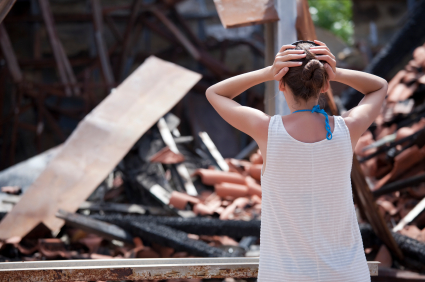
In a matter of minutes, an entire community can be devastated by forces they cannot control. Whether it is natural or manmade, disasters are traumatic, and nearly everyone who experiences this kind of stress will need help coping with what they have experienced.
Traumatic Stress
Different types of natural disasters present different stress varying by how close the person is to the event. In some cases people will have trauma from loss, while others may feel guilt because they survived. Females tend to be more susceptible to trauma, but children and the elderly are the most susceptible to serious trauma. In all causes, the experience is an unexpected perceived brush with death.
Hurricanes- While hurricanes come with some warning, they also present stress in the wait to see if or where it will strike. This gives some preparation time, and time to gather things that are important, but extreme weather conditions such as thunder, lightning, rain and wind trigger panic reactions. People are left exhausted, and may suffer survivor guilt, and loss, in addition to injury.
Earthquake- Earthquakes are unpredictable, and do not have a defined end due to aftershocks. Lack of control combined with the fear of another quake can cause a person to have a heightened sense of fear. Sights and smells keep the person in a constant reminder state.
Tornado- Tornadoes give little to no time to prepare. For those who take refuge, not knowing what is happening, while hearing the sounds of destruction around them with no control over their situation is terrifying. Confusion is common. Destruction, sights and smells linger long after. In addition to loss, survivors may feel survivor guilt.
Flood- With floods come desolation of land. A sense that the earth is one thing that is stable is lost. Smell of wet, cold, mud and seeing the devastation of landscapes as well as infrastructure leaves an unstable feeling. Floods do not recede quickly, and cleanup may take a long time, creating exhaustion.
Wildfires- While fires often come with some warning, wind can change the course, and so many are unsure during the wait. Fire does not just ruin things, or remove them, it consumes them. Entire neighborhoods and communities can turn to ash, leaving people misplaced and vulnerable. [1]
Violence- Manmade disasters are unexpected, unfamiliar, and uncontrollable. For those who experience violence at the hands of another human being, trust in others can be lost, leaving them feeling unsafe, vulnerable, and often times, angry with a feeling that it should have been prevented. People may experience nightmares, and be reminded of their grief by seeing upsetting images, and experience upsetting thoughts for some time.
Consequences of Traumatic Stress
It is important for those who have experienced traumatic stress to understand that some of the feelings they experience are normal, and expected. The time it takes to see resilience will vary with the individual. Some common responses to traumatic stress may include:
Uncertainty- Mental and physical exhaustion, shock, disbelief, fear, helplessness, feeling a lack of control, loss of property, loved one, mementos, and income may result in feeling lost or numb. Pre-existing stresses resurface, or seem larger. Anniversaries of traumatic events may trigger the same feelings. Anger at God or others that the survivor may feel were responsible may also cause guilt.
Physical- Responses such as headaches, nausea, chest pain, and sleeplessness are common.
Relationship changes- Relations become tense, routines disrupted, and fear in losing loved ones may cause clinging in children, and tension in adults. Children may not fully understand what happened, and are put in a more responsible role. With their parents upset, children may feel they are still not safe. Children may feel lack of attention due to attention being placed on clean-up/repair. Parents may feel protective of their children and how they are processing the event.
Teens may revert to younger behavior.
Older people, who may suffer from previous health concerns, or have trouble hearing or seeing, may feel incompetent or a burden to the situation.
Work- Increased stress and disruptions in routines results in fatigue, inattention, conflict with others, reduced time available, reduced wages.
Financial- Destruction will change the standard of living. Unpaid bills may cause frustration and seeking financial assistance can add more stress. The financial burden for someone who was financially secure prior to the event will be less than for someone who was already burdened prior to the event.
First responders- While working long hours under intense stress over time, first responders witness human harm, and destruction. They may have their own injuries, depression, and PTSD. [2]
Resilience factors
Social support- Those who have communication and a culture of understanding tend to move more quickly toward emotional resilience.
Coping confidence- Sometimes knowing you will be ok, and that you can do it makes it easier to cope.
Hope- Looking at a positive future, and being able to see better things to come can make an impact on how the future will be for the survivor, and how quickly they feel better.
Therapy focuses on the resilience factors for those who feel overwhelmed by traumatic stress.
________________________________________________________________
[1] Lazarus, P. J., & Jimerson, S. R., Brock, S. E. (2002). Natural Disasters. In S. E. Brock, P. J. Lazarus, & S. R. Jimerson (Eds.), Best Practices in School Crisis Prevention and Intervention (pp. 435-450), Bethesda, MD: National Association of School Psychologists and other crisis information posted on the NASP website at www.nasponline.org.
[2] "Coping With a Traumatic Event." Emergency Preparedness and Response. CDC, 12 June 2003. Web. 06 July 2013